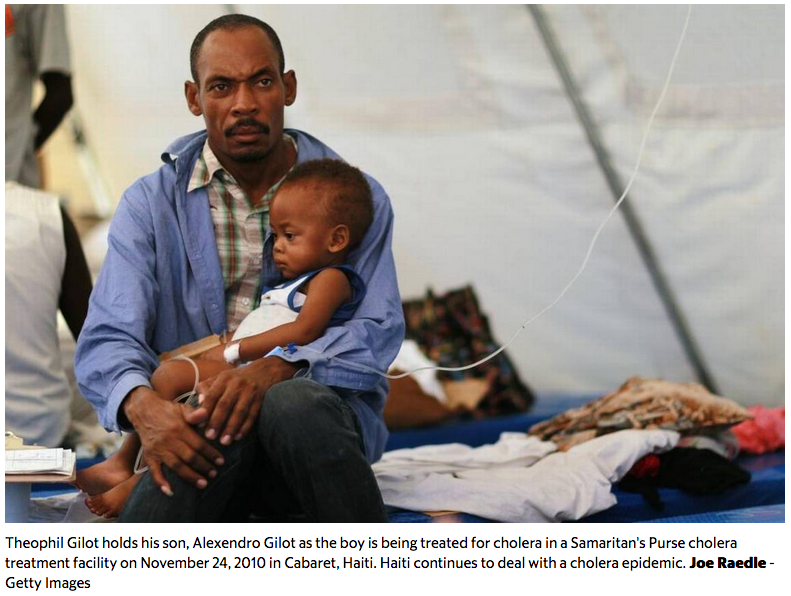By Jacqueline Charles
August 11, 2017 4:54 PM
In Haiti, 69 children out of every 1,000 born alive still die before their fifth birthday. And many of those deaths are from diseases that are preventable by vaccination.
Still, the country has one of the lowest immunization rates — 58 percent — in the hemisphere.
“You don’t really need bricks and mortar to immunize a child. You can immunize a child under a tree,” said Anuradha Gupta, deputy CEO of the Global Alliance for Vaccines and Immunization, or Gavi. “It takes really very little.”
Worried about Haiti’s low immunization coverage and high child mortality rate, Gupta will lead a three-day mission to Port-au-Prince on Tuesday to push Haiti’s new government to increase its budget for immunizations and health. Gupta will be joined by representatives from other health-financing donor groups including the Pan American Health Organization/World Health Organization, UNICEF and the U.S. Agency for International Development.
Gupta is hoping that with a doctor in charge of the government — new Prime Minister Jack Guy Lafontant is a gastroenterologist — Haitian leaders will recognize the importance of investing more of their meager resources into health.
“The fact they have new leaders, new people at the helm of affairs – this really gives us hope and optimism that we can have a renewed dialogue,” she said.
A public-private international vaccine alliance, Gavi has committed almost $50 million to Haiti until 2020 as part of its commitment to increase access to immunizations in poor countries. Among the vaccines it has supported in Haiti: the one for rotavirus, to protect young children against the deadly form of diarrhea. It has also supported several cholera vaccine campaigns since the deadly waterborne virus was introduced by U.N. peacekeepers 10 months after the cataclysmic 2010 earthquake.
New commitments include about an additional $20 million in a health-systems strengthening grant and technical support for the next five years.
Despite the money already spent and various vaccination campaigns over the years, Haiti continues to see a high number of children and infants die from major killers like diarrhea and pneumonia.
As a result of drops in routine immunization coverage, for example, Haiti has seen an increase of diphtheria outbreaks since 2014. There were 247 probably cases of the easily preventable disease. Of them, 107 were lab-confirmed cases, with 39 deaths as of May. In the majority of cases, said Gavi spokesperson Frédérique Tissandier, the vaccination status is unknown.
Although cases have spread to six of the 10 regional departments, the Artibonite, Center and West departments have been the most affected, Tissandier said, “which is not surprising as routine coverage in those three departments show the highest numbers of [under-vaccinated] children for the same period.”
Gupta said Gavi and its partners are seeking a “strong political commitment for a better performing immunization program so that children actually benefit from life-saving vaccines.” The group also wants to have “a constructive and positive dialogue” with Lafontant and President Jovenel Moïse, she said, on “stepped-up domestic investments.”
Such an increase would allow Haiti to better leverage Gavi and other donor investments toward improved health outcomes for all Haitian children. But that requires political will.
In June, the World Bank, which has also help finance Gavi’s vaccinations in Haiti, echoed concerns about Haiti’s declining health spending on the heels of a study by one of its economists. The study found that Haiti spends less on health —$13 per capita a year — for its nearly 11 million citizens than either the Dominican Republic or Cuba, and most low-income countries. The Dominican Republic spends $180 while Cuba spends $781. The average for most low-income countries is $15, according to the study.
The World Bank study also found that the Haitian government’s health expenditures has been sharply declining for the past 20 years, from 16.6 percent of an approximate $2 billion budget to 4.4 percent of the current $1.8 billion operating budget.
Under a proposed $2.2 billion budget that was sent to parliament weeks after the study, health expenditures did see a slight increase. But the proposed $94.8 million for health is less than the $110 million proposed for the country’s 146 elected lawmakers in parliament. And the money, critics say, is nowhere near adequate to address the critical problems in the country’s fractured healthcare system, which is susceptible to repeated strikes by doctors and staff at its public hospitals, leaving the poor to fend for themselves.
“Gavi,” Gupta said, “really believes in sustainability and strong country ownership, so I think that is a very important area of discussion.”
